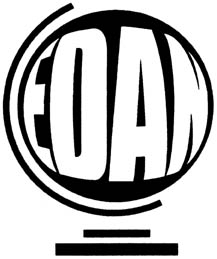
Introducing the EDAN Network
 |
Introducing the EDAN Network
|
| During the 8th Assembly of the WCC at Harare, Zimbabwe in December 1998, a number of persons participated as advisors on disability concerns. This was the springboard for the establishment of the Ecumenical Disability Advocates Network (EDAN), a project of the WCC - Justice, Peace and Creation Teamís work on Persons with Disabilities. The primary objective of the Network is to support the work of individuals, churches and church organisations concerned with the issues affecting disabled people globally. Its task is to support the work of individuals, churches and non-church organisations concerned with issues affecting disabled people globally and to advocate for a just and inclusive community by creating a network of people with disabilities as a distinctive ecumenical contribution to new models of being a church. Members of the network have also engaged in theological reflection on disability in order to provide a foundation for church engagement so as to advise WCC on how to improve conditions affecting disabled people in the churches globally. A major issue for further discussion with churches, national ecumenical bodies and regional ecumenical organisations in res-pect to inclusion and full participation of people with disabilities in their ministries. The National Council of Churches of Kenya (NCCK), which was already running a fully-fledged desk for persons with handicaps, was chosen to offer a home for a coordinating office. EDAN is presently administered by a part-time consultant under WCC auspices. The consultant, Rev. Samuel Kabue, is also director of the NCCK Advocacy Unit. EDAN has two dimensions: as a movement and as an institution. As a movement it will continue to develop regional networks to lobby for the cooperation of persons with disabilities in the general life of the church. At the institutional level, EDAN will be part of the WCC structure within the Justice, Peace and Creation (JPC) Team. A three-member core group - Rev. Kathy Reeves (USA), Rev. Arne Fritzon (Sweden) and Rev. Dr. Gordon Cowans (Jamaica) - supports and assists the consultant.
EDAN publishes a quarterly newsletter available from: |

|